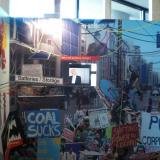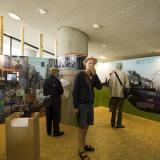Energy Landscapes 3.0 at Über Lebenskunst Festival
workshop results presented in Berlin's "Haus der Kulturen der Welt"
International Summer School 2011: Energy Landscapes 3.0 Since the outset of industrialisation, the natural deposits of fossil fuels (coal, gas, oil) and the geography of their conversion, distribution, interim storage and use have influenced spatial development. The compartmentalised structures of the pre-fossil fuel era gave way to the fossil fuel era and its transcontinental networks and systems. Today, this begs the question of which geographies will be influenced by the post-fossil fuel era. In the debate on renewable energies and climate protection, the question of which new networks are required has steadily gained importance. In the process, it is becoming increasingly clear that the megastructures of the fossil fuel era cannot be substituted by a myriad of small, decentralised energy productions alone, as in the pre-fossil fuel era, but that megastructures per se must be reconsidered in an intelligent way. This geography of energy systems is not only a technological issue, but also an important factor for spatial development, whether on a small or a large scale.
The objective of the Summer School Energy Landscapes 3.0 is to analyse potential network geographies and concepts and their impacts on settlement structures in Europe. We will thereby explicitly refer to a chronicle of utopian thought on a large scale – visionary ideas for new Energy Landscapes promulgated decades ago by Sörgel in 1928 with Atlantropa and Richard Buckminster Fuller with his World Game in 1972. The results of the summer school will be presented during the festival Über Lebenskunst at the Haus der Kulturen der Welt.
participants Summer School "Energylandscapes 3.0"
Alejandro Acevedo,Mexiko
Beatriz Alcaine, Spanien
Amr Auf,Ägypten
Karl Beelen, Belgien
Iris Cantante, Portugal
Cinthia Cavazos,Mexiko
Liz Helen Christensen,Dänemark
Liza Christensen, Dänemark
Megan Dalmau Buensuceso, Dänemark
Maja Daskalovska, Mazedonien
Andreas Rene Dittrich, Deutschland
Bianca Dobru, Rumänien
Marcos Dornelles dos Santos, Brasilien
Shelby Doyle, USA
Nermin El-Sherif Nermin, Ägypten
Linda Fährmann, Deutschland
Sofia Fernandez Rosso, Argentinien
Sabine Fritz, Deutschland
Christina Genböck, Deutschland
Valentin Gheorghian, Rumänien
Marzieh Gholami, Iran
Katrin Hoppe, Deutschland
Kate Ivey-Williams, UK
Nino Kapanadze, Georgien
Martina Keller, Deutschland
Birte Loeffler, Deutschland
Mohammed Mamdouh Saad Hammad, Ägypten
Francesca Marinelli, Italien
Elena Markova, Russland
Catalina Eugenia Matei, k.A.
Gabriela Mero Franco, Equador
Daniel Morales, Kolumbien
Nitin Narang, Indien
Sue Ann Ng, Malaysia
Marcus Owens, USA
Haris Piplas, Bosnien und Herzeg.
María de los Angeles Quintanilla, Mexiko
Dijana Radevic, Montenegro
Griselda Ramaj, Albanien
Roxy Rieder, Österreich
Juliane Schneegans, Deutschland
Mousa Sedehi, Iran
Petr Šimek, Tschechien
Ruben Stuijk, Belgien
Otar Sulaberidze, Georgien
George Tvildiani, Georgien
Ana Vrgoc, Kroatien
Shannon Werle, USA
Toni Williams, USA
Jessica Wolff, USA
Razvan Zamfira, Rumänien


